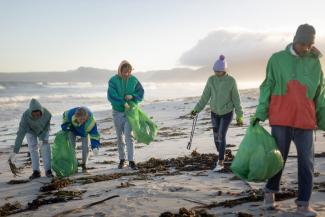
Instructions
Do the preparation task first. Then read the article and do the exercises to check your understanding.
World Oceans Day
Did you know that 71 per cent of our planet is covered in ocean? That's why we call Earth the 'Blue Planet'. People around the world wear blue to celebrate World Oceans Day on 8 June every year. United Nations World Oceans Day is a special day for learning about oceans, why they're in danger and how essential it is to protect them.
The world's oceans
There are five oceans on Earth: the Pacific Ocean, the Atlantic Ocean, the Indian Ocean, the Southern Ocean and the Arctic Ocean. The Pacific Ocean is the biggest of them all and is even bigger than all the land on Earth combined. The Arctic Ocean is the smallest and is frozen for much of the year. But because of global warming the ice is melting. Scientists predict that Arctic ice will soon disappear during the summer if we don't limit the rise in global temperatures.
Why we need oceans
Without oceans, life couldn't exist. Scientists don't know the exact number, but they think that oceans are home to 50 to 80 per cent of all species on Earth, from gigantic whales to microscopic plankton. Oceans hold about 97 per cent of all the water on our planet and give us rainwater and drinking water through the water cycle. Did you know that at least half the oxygen we breathe comes from the plants in the ocean? Oceans absorb carbon dioxide and give out oxygen.
How we use oceans
Humans use the ocean in many different ways. A lot of our food comes from oceans, and millions of people worldwide have jobs related to fishing and fish farming. Oceans also provide us with much of our energy. We've been getting oil and gas from beneath the ocean floor for a long time, but now we realise that renewable energy is essential for the future. We can use the power of waves and tides to produce electricity, and many wind farms are located offshore. We even rely on oceans for international communication – 99 per cent of internet traffic between countries goes via submarine cables!
Plastic pollution
Our oceans play an essential part in our lives, but sadly they are in danger. You've probably heard of plastic pollution. Billions and billions of pieces of plastic are floating around in our oceans, and there are five enormous patches of plastic in the oceans around the world. The biggest one, the 'Great Pacific Garbage Patch', is seven times the size of the UK! Plastic pollution is harming and killing sea creatures like fish, birds and turtles. It's also dangerous for our health too, because fish eat the tiny pieces of plastic and then humans eat the fish.
What we can do to help
For World Oceans Day you could join in a beach clean-up to help prevent plastic and other rubbish getting into the sea. If you don't live near the coast, you can still get involved! You could use social media platforms to share posts, photos or videos that show how important oceans are and why we need to protect them. You could take part in a photo, art or writing contest around the theme of the ocean or watch ocean-related films and documentaries. Remember that every day we can make a difference by using less plastic and recycling, and by talking to others about protecting our precious oceans.
How important do you think oceans are?
